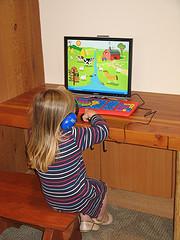
San Mateo County Library—Early Literacy Computer Stations (Photo credit: San Mateo County Library)
“Short but intense training sessions in the form of structured language games from the age of four can stimulate children’s early language development and may also make it easier for children to learn to read. This is found in a current research project at the University of Gothenburg, Sweden.”
Games are not new learning methods just to acquire foreign language learning. In fact, we can attest that in the recent articles we have posted, including games while the learner is learning his target language makes the perfect stress-free enjoyable exercises that will allow them to study without any hassle.
And studies can also attest the effectiveness for such method as well.
According to Science Daily, such language games will enhance children’s language development, which actually makes the specific reading aspect of the learners incredibly develop more.
Quoting the resource, “previous research has shown that children’s reading development can be stimulated with structured and playful language games from the age of six.” In fact, the researchers from the University of Gothenburg had conducted its three-year study and they have proven their hypothesis right.
They’ve always looked forward for the success of their studies that “young children who are actively stimulated in their development of so-called linguistic and phonological awareness end up better prepared for dealing with written language. Linguistic awareness means that the child is aware of his or her own language, what it sounds like and how it consists of words and sentences. Phonological awareness implies an awareness of the sound structure of the language, which is important for the early stages of reading development and for understanding the connection between letters and sounds.”
They conducted several phonological trainings that will test the comprehension of children. Stated by Senior Lecturer Ulrika Wolff, “the children in the intervention group had a higher level of phonological awareness. They were for example able to identify and manipulate speech sounds. Rhyming is one example of this. The ability to recognize the form of the language is something that researchers know is important for early reading development.”
This is good news indeed. So whenever your child is interested to learn Russian at language school, or in any language school that he or she is interested to take, encourage them to study to play language games.
